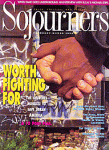This plan emerged from churches working in Boston's inner-city neighborhoods.
The following 10 point proposal for citywide church mobilization is born of the realities of our day-to-day work with the youth on the streets, in the crack houses, and in the courts and jails of this city. We seek to generate serious discussion regarding the specific ways the Christian community can bring the peace of God to the violent world of our youth.
We therefore call upon churches, church agencies, and the academic theological community throughout the city to consider, discuss, debate, and implement, singly or in collaboration, any one or more of the following proposals:
1. To establish four or five church cluster-collaborations that sponsor "Adopt a Gang" programs to organize and evangelize youth in gangs. Inner-city churches would serve as drop-in centers providing sanctuary for troubled youth.
2. To commission missionaries to serve as advocates for black and Latino juveniles in the courts. Such missionaries would work closely with probation officers, law enforcement officials, and youth street workers to assist at-risk youth and their families.
To convene summit meetings between school superintendents, principals of public middle and high schools, and black and Latino pastors to develop partnerships that will focus on the youth most at risk. We propose to do pastoral work with the most violent and troubled young people and their families. In our judgment this is a rational alternative to ill-conceived proposals to suspend the principle of due process.
3. To commission youth evangelists to do street-level one-on-one evangelism with youth involved in drug trafficking. These evangelists would also work to prepare these youth for participation in the economic life of the nation. Such work might include preparation for college, the development of legal revenue-generating enterprises, and the acquisition of trade skills and union membership.
4. To establish accountable community-based economic development projects that go beyond "market and state" visions of revenue generation. Such economic development initiatives will include community land trusts, micro-enterprise projects, worker cooperatives, community finance institutions, consumer cooperatives, and democratically run community development corporations.
5. To establish links between suburban and downtown churches and front-line ministries to provide spiritual, human resource, and material support.
6. To initiate and support neighborhood crime-watch programs within local church neighborhoods. If, for example, 200 churches covered the four corners surrounding their sites, 800 blocks would be safer.
7. To establish working relationships between local churches and community-based health centers to provide pastoral counseling for families during times of crisis. We also propose the initiation of abstinence-oriented educational programs focusing on the prevention of AIDS and sexually transmitted diseases.
8. To convene a working summit meeting for Christian black and Latino men in order to discuss the development of Christian brotherhoods that would provide rational alternatives to violent gang life. Such brotherhoods would also be charged with fostering responsibility to family and protecting houses of worship.
9. To establish rape crisis drop-in centers and services for battered women in churches. Counseling programs must be established for abusive men, particularly teen-agers and young adults.
10. To develop an aggressive black and Latino history curriculum, with an additional focus on the struggles of women and poor people. Such a curriculum could be taught in churches as a means of helping our youth to understand that the God of history has been and remains active in the lives of all peoples.
Principal authors: Jeffrey L. Brown, Union Baptist Church; Ray A. Hammond, Bethel African Methodist Episcopal Church; Eugene F. Rivers, Azusa Christian Community; Susie Thomas, Mt. Olive Temple of Christ; Gilbert A. Thompson, New Covenant Christian Center; Bruce H. Wall, Dorchester Temple Baptist Church; Samuel C. Wood, Lord's Family African Methodist Episcopal Zion Church. Brown, Hammond, and Wood are members of the executive committee of the Ten Point Coalition.

Got something to say about what you're reading? We value your feedback!
